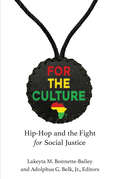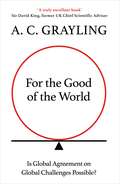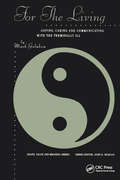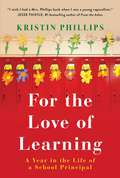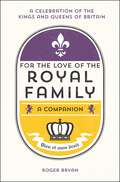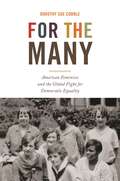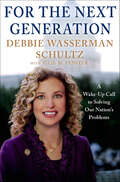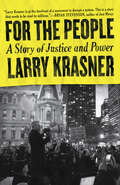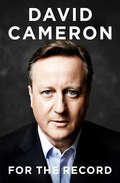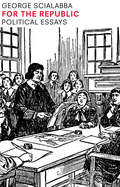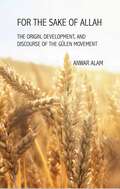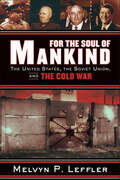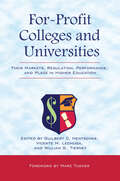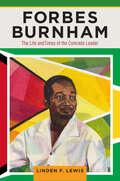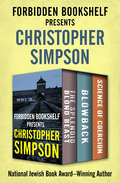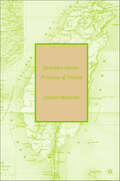- Table View
- List View
For the Culture: Hip-Hop and the Fight for Social Justice (Music and Social Justice)
by Lakeyta Bonnette-Bailey Adolphus BelkFor the Culture: Hip-Hop and the Fight for Social Justice documents and analyzes the ways in which Hip-Hop music, artists, scholars, and activists have discussed, promoted, and supported social justice challenges worldwide. Drawing from diverse approaches and methods, the contributors in this volume demonstrate that rap music can positively influence political behavior and fight to change social injustices, and then zoom in on artists whose work has accomplished these ends. The volume explores topics including education and pedagogy; the Black Lives Matter movement; the politics of crime, punishment, and mass incarceration; electoral politics; gender and sexuality; and the global struggle for social justice. Ultimately, the book argues that hip hop is much more than a musical genre or cultural form: hip hop is a resistance mechanism.
For the Good of the World: Is Global Agreement on Global Challenges Possible?
by A. C. Grayling&‘A must read&’ Gordon Brown &‘A truly excellent book&’ Sir David King The three biggest challenges facing the world today, in A. C. Grayling&’s view, are climate change, technology and justice. In his timely new book, he asks: can human beings agree on a set of values that will allow us to confront the numerous threats facing the planet, or will we simply continue with our disagreements and antipathies as we collectively approach our possible extinction? As every day brings new stories about extreme weather events, spyware, lethal autonomous weapons systems, and the health imbalance between the northern and southern hemispheres, Grayling&’s question – Is Global Agreement on Global Challenges Possible? – becomes ever more urgent. The solution he proposes is both pragmatic and inspiring.
For the Living: Coping, Caring and Communicating with the Terminally Ill (Death, Value and Meaning Series)
by Mark GolubowRarely heard about in our society are caregivers' thoughts and feelings about life, death, and dying and how they act on those feelings. "For the Living: Coping, Caring and Communicating with the Terminally Ill" provides an in-depth, qualitative look at the experiences of oncology healthcare professionals as they work with terminally ill patients. Through a series of recorded and edited interviews, the author explores the social and cultural dynamics that affect physicians, nurses, and social workers routinely encountering mortality and loss. What death and the prospect of dying mean to these individuals should not be taken lightly.
For the Love of Humanity: The World Tribunal on Iraq (Pennsylvania Studies in Human Rights)
by Ayça ÇubukçuOn February 15, 2003, millions of people around the world demonstrated against the war that the United States, the United Kingdom, and their allies were planning to wage in Iraq. Despite this being the largest protest in the history of humankind, the war on Iraq began the next month. <P><P>That year, the World Tribunal on Iraq (WTI) emerged from the global antiwar movement that had mobilized against the invasion and subsequent occupation. Like the earlier tribunal on Vietnam convened by Bertrand Russell and Jean-Paul Sartre, the WTI sought to document—and provide grounds for adjudicating—war crimes committed by the United States, the United Kingdom, and their allied forces during the Iraq war.For the Love of Humanity builds on two years of transnational fieldwork within the decentralized network of antiwar activists who constituted the WTI in some twenty cities around the world. <P><P>Ayça Çubukçu illuminates the tribunal up close, both as an ethnographer and a sympathetic participant. In the process, she situates debates among WTI activists—a group encompassing scholars, lawyers, students, translators, writers, teachers, and more—alongside key jurists, theorists, and critics of global democracy.WTI activists confronted many dilemmas as they conducted their political arguments and actions, often facing interpretations of human rights and international law that, unlike their own, were not grounded in anti-imperialism. <P><P>Çubukçu approaches this conflict by broadening her lens, incorporating insights into how Amnesty International, Human Rights Watch, and the Iraqi High Tribunal grappled with the realities of Iraq's occupation. Through critical analysis of the global debate surrounding one of the early twenty-first century's most significant world events, For the Love of Humanity addresses the challenges of forging global solidarity against imperialism and makes a case for reevaluating the relationships between law and violence, empire and human rights, and cosmopolitan authority and political autonomy.
For the Love of Learning: A Year in the Life of a School Principal
by Kristin PhillipsFor parents, teachers, and everyone who remembers being a student, an unforgettable glimpse into the inner workings of school, from a life-long educator.Children spend most of their waking hours in school, exploring boundaries, forming important relationships, and of course, learning. But as you step into the unique vantage of the principal&’s office, you experience first-hand the wide range of characters, efforts, and decisions that ensure all students thrive. Kristin Phillips takes us through a school year, from the excitement of fall, through the long days of winter, and into the renewed energy that comes with spring. Through her eyes, we experience the increasingly complex education system: students with unique learning needs, teachers bringing their practice into the 21st century, and the parent-partners who have entrusted their children to the school system. Myles, a precocious five-year-old, introduces himself by swearing a blue streak on the first day of school. He finds solace in a paper box rocket ship in Phillips&’s office. Rafi, a grade 8 boy oozing with attitude, makes a very uncool choice to lunch with the principal. And Harriet, a struggling teacher, is oblivious to the fact her students are bored to tears. Throughout the story, Phillips develops caring relationships with the people who need her the most, as she works with colleagues to create an environment where everyone succeeds. But principals are people, too, and Phillips also recounts the demands on her as a single mother with three teenagers, one of whom suffers from significant mental health issues. As an educator, she tries to help students coping with similar problems and reveals a heartfelt story of dealing with the system, from both sides. With honesty and compassion, Phillips gives a human face to the joys of school, and the very real difficulties educators work to overcome, one year and one student at a time.
For the Love of the Royal Family: A Companion
by Roger BryanThis rich miscellany celebrates the fascinating history of the British Royal Family, from the reign of Egbert, King of Wessex, to the monarchy of the present day, with titillating trivia, little-known facts, bite-size biographies and memorable quotations.
For the Love of the Royal Family: A Companion
by Roger BryanThis rich miscellany celebrates the fascinating history of the British Royal Family, from the reign of Egbert, King of Wessex, to the monarchy of the present day, with titillating trivia, little-known facts, bite-size biographies and memorable quotations.
For the Many: American Feminists and the Global Fight for Democratic Equality (America in the World #56)
by Dorothy Sue CobbleA history of the twentieth-century feminists who fought for the rights of women, workers, and the poor, both in the United States and abroadFor the Many presents an inspiring look at how US women and their global allies pushed the nation and the world toward justice and greater equality for all. Reclaiming social democracy as one of the central threads of American feminism, Dorothy Sue Cobble offers a bold rewriting of twentieth-century feminist history and documents how forces, peoples, and ideas worldwide shaped American politics. Cobble follows egalitarian women’s activism from the explosion of democracy movements before World War I to the establishment of the New Deal, through the upheavals in rights and social citizenship at midcentury, to the reassertion of conservatism and the revival of female-led movements today.Cobble brings to life the women who crossed borders of class, race, and nation to build grassroots campaigns, found international institutions, and enact policies dedicated to raising standards of life for everyone. Readers encounter famous figures, including Eleanor Roosevelt, Frances Perkins, and Mary McLeod Bethune, together with less well-known leaders, such as Rose Schneiderman, Maida Springer Kemp, and Esther Peterson. Multiple generations partnered to expand social and economic rights, and despite setbacks, the fight for the many persists, as twenty-first-century activists urgently demand a more caring, inclusive world.Putting women at the center of US political history, For the Many reveals the powerful currents of democratic equality that spurred American feminists to seek a better life for all.
For the Muslims: Islamophobia in France
by Edwy PlenelA piercing denunciation of Islamophobia in France, in the tradition of Emile ZolaAt the beginning of the twenty-first century, leading intellectuals are claiming "There is a problem with Islam in France," thus legitimising the discourse of the racist National Front. Such claims have been strengthened by the backlash since the terrorist attacks in Paris in January and November 2015, coming to represent a new 'common sense' in the political landscape, and we have seen a similar logic play out in the United States and Europe.Edwy Plenel, former editorial director of Le Monde, essayist and founder of the investigative journalism website Mediapart tackles these claims head-on, taking the side of his compatriots of Muslim origin, culture or belief, against those who make them into scapegoats. He demonstrates how a form of "Republican and secularist fundamentalism" has become a mask to hide a new form of virulent Islamophobia. At stake for Plenel is not just solidarity but fidelity to the memory and heritage of emancipatory struggles and he writes in defence of the Muslims, just as Zola wrote in defence of the Jews and Sartre wrote in defence of the blacks. For if we are to be for the oppressed then we must be for the Muslims.From the Trade Paperback edition.
For the Next Generation: A Wake-Up Call to Solving Our Nation's Problems
by Julie M. Fenster Debbie Wasserman SchultzCongresswoman and Democratic National Committee Chair Debbie Wasserman Schultz challenges the nation to resolve tough issues for future generations.America has witnessed the dangers that come with shortsightedness, writes Debbie Wasserman Schultz in For the Next Generation. If we want to ensure prosperity for ourselves and an improved way of life for young Americans, we have to change, starting now. We must:· Create jobs· Turned around our economy· Formulate a long-term energy solution· Reform immigration policies· Enhance and expand health-care coverageYet these important issues have been sidelined by gridlock in a Congress that is too concerned about the next election to worry about the future. The group of Americans who have the most to lose from this dysfunction are the ones least represented in government: America's children. For the Next Generation is a call to action, one mother's challenge to her congressional colleagues and to the rest of the nation, to adopt a parent's perspective for doing right by kids.Marked by clarity and by Debbie's characteristic poise, this polemic is informed by the congresswoman's own personal and professional experiences. It digs deep, exposing very real threats that America faces as a result of its failure to confront tough decisions. Debbie conveys a vision of an America that has learned hard lessons from its recent past, an America galvanized by a renewed sense of purpose for applying that wisdom through forward-thinking policies on education, civil rights, and foreign policy. She describes how she will fight to overcome the legislative obstacles that inhibit progress, and she calls upon fair-minded Americans to lend their own strengths to securing a better tomorrow for the next generation.
For the People: A Story of Justice and Power
by Larry KrasnerPhiladelphia&’s progressive district attorney offers an inspiring vision of how people can take back power to reform criminal justice, based on lessons from a life&’s work as an advocate for the accused.&“Larry Krasner is at the forefront of a movement to disrupt a system. This is a story that needs to be read by millions.&”—Bryan Stevenson, author of Just MercyLarry Krasner spent thirty years learning about America&’s carceral system as a civil rights and criminal defense lawyer in Philadelphia, working to get some kind of justice for his clients in a broken system, before deciding that the way to truly transform the system was to get inside of it. So he launched an unlikely campaign to become the district attorney of Philadelphia, a city known for its long line of notorious &“tough on crime&” DAs who had turned Philly into a city with one of the highest rates of incarceration in the country. Despite long odds and derisive opposition from the police union and other forces of the status quo, Krasner laid out a simple case for radical reform and won the November general election by a margin of nearly 50 percent.For the People is not just a story about Krasner&’s remarkable early life as a defense lawyer and his powerful, grassroots campaign; it&’s also a larger exploration of how power and injustice conspired to create a carceral state unprecedented in the world. Readers follow Krasner&’s lifelong journey through the streets and courtrooms and election precincts of one American city all the way up to his swearing-in ceremony to see how our system of injustice was built—and how we might dismantle it.In the tradition of powerful critiques of the criminal justice system, from Bryan Stevenson&’s Just Mercy to Michelle Alexander&’s The New Jim Crow, For the People makes the powerful case that transforming criminal justice is the most important civil rights movement of our time and can only be done if we&’re willing to fight for the power to make a change.
For the Record
by David CameronA #1 bestseller in England, former Prime Minster David Cameron’s For the Record shares his views on his political career and the state of the UK.David Cameron was elected Conservative leader in 2005, promising to modernize the party following its three successive electoral defeats. He became Prime Minister in 2010, forming Britain’s first coalition government in seventy years, at a moment of economic crisis, and went on to win the first outright Conservative majority for twenty-three years at the 2015 general election.In For the Record, Cameron explains how the governments he led transformed the UK economy while implementing a modern, compassionate agenda that included reforming education and welfare, legalizing gay marriage, honoring the UK’s commitment to overseas aid and spearheading environmental policies. He will shed light on the seminal world events of his premiership—the Arab Spring; the rise of ISIS; the invasion of Ukraine; the conflicts in Libya, Iraq and Syria—as well as events at home, from the Olympic Games in 2012 to the Scottish referendum. He provides his perspective on the EU referendum and his views on the future of Britain’s place in the world following Brexit.Revealing the battles and achievements of his life and career in intimate and frank detail, For the Record is an important assessment of the significant political events of the 2010s, the nature of power and the role of leadership at a time of profound global change.
For the Record: From Wall Street to Washington
by Donald T. ReganThis is a deep and informative study of the inner workings of the Reagan White House, and is based on the thorough notes by the author while he was in the administration.
For the Record: On Sexuality and the Colonial Archive in India
by Anjali ArondekarAnjali Arondekar considers the relationship between sexuality and the colonial archive by posing the following questions: Why does sexuality (still) seek its truth in the historical archive? What are the spatial and temporal logics that compel such a return? And conversely, what kind of "archive" does such a recuperative hermeneutics produce? Rather than render sexuality's relationship to the colonial archive through the preferred lens of historical invisibility (which would presume that there is something about sexuality that is lost or silent and needs to "come out"), Arondekar engages sexuality's recursive traces within the colonial archive against and through our very desire for access. The logic and the interpretive resources of For the Record arise out of two entangled and minoritized historiographies: one in South Asian studies and the other in queer/sexuality studies. Focusing on late colonial India, Arondekar examines the spectacularization of sexuality in anthropology, law, literature, and pornography from 1843 until 1920. By turning to materials and/or locations that are familiar to most scholars of queer and subaltern studies, Arondekar considers sexuality at the center of the colonial archive rather than at its margins. Each chapter addresses a form of archival loss, troped either in a language of disappearance or paucity, simulacrum or detritus: from Richard Burton's missing report on male brothels in Karchi (1845) to a failed sodomy prosecution in Northern India, Queen Empress v. Khairati (1884), and from the ubiquitous India-rubber dildos found in colonial pornography of the mid-to-late nineteenth century to the archival detritus of Kipling's stories about the Indian Mutiny of 1857.
For the Republic: Political Essays
by George ScialabbaEssays and reviews concentrating on politics, economics, sociology and culture. Most of the essays began as book reviews. As book reviews they were superior when published. As essays they are exceptional for their intelligence and clarity. George’s subjects are politics, religion and society. His subject is what people who are thinking ought to be paying attention to. The current cliché is that America has no public intellectuals. Every sentence George writes gives the lie to this bit of lazy journalese.
For the Sake of Allah: The Origin, Development and Discourse of The Gulen Movement
by Anwar AlamFor the Sake of Allah explores the Gülen Movement, also known as Hizmet, a religio-social movement inspired by Fethullah Gülen, one of the most prominent Islamic scholars of Turkish origin in the modern world. Notwithstanding the current purge of Hizmet under the Erdoğan regime, it is one of the most interesting faith-based movements to arise from a Muslim society in the twentieth century. Since the late 1960s, Hizmet has opened thousands of schools around the world and has also contributed to relief efforts in Turkey and abroad.In this book, Anwar Alam shares a decade of research and field work based on the religious, educational, political, and social contexts that have shaped the essential dynamics of both Gülen and the Movement. At a time when the Gülen Movement has been primarily analyzed and debated through the &“state prism&” and &“security discourse,&” especially following the failed Turkish military coup of July 2016, this book takes a longue durée perspective and provides a holistic treatment of Hizmet as essentially a postmodern phenomenon.
For the Soul of Mankind: The United States, the Soviet Union, and the Cold War
by Melvyn P. Leffler“A masterful account of the Cold War by a distinguished historian in full stride.” —G. John Ikenberry, Foreign AffairsTo the amazement of the public, pundits, and even the policymakers themselves, the ideological and political battles that endangered the world for half a century came to an end in 1990. How did that happen? What caused the cold war in the first place, and why did it last as long as it did?To answer these questions, Melvyn P. Leffler homes in on four crucial episodes when American and Soviet leaders considered modulating, avoiding, or ending their global struggle “for the soul of mankind,” and asks why they failed: Stalin and Truman devising new policies after 1945; Malenkov and Eisenhower exploring the chance for peace after Stalin’s death in 1953; Kennedy, Khrushchev, and LBJ trying to reduce tensions after the Cuban Missile Crisis of 1962; and Brezhnev and Carter aiming to sustain détente after the Helsinki Conference of 1975. Leffler then illuminates how Reagan, Bush, and, above all, Gorbachev managed to extricate themselves form the policies and mind-sets that had imprisoned their predecessors, making it possible to reconfigure Soviet-American relations after decades of confrontation.Praise for For the Soul of Mankind“[A] sweeping work . . . Leffler is one of America’s most distinguished cold war historians, and this enlightening, readable study is the product of years of research and reflection.” —Jonathan Rosenberg, The Christian Science Monitor“Leffler has produced possibly the most readable and insightful study of the Cold War yet.” —Publishers Weekly, (starred review)“Professor Leffler has the benefit of almost two decades of hindsight as well as access to recently declassified American and Soviet documents. The result is a series of fresh and often provocative perspectives on the struggle.” —Booklist
For the Sun After Long Nights: The Story of Iran's Women-Led Uprising
by Fatemeh Jamalpour Nilo TabrizyLONGLISTED FOR THE NATIONAL BOOK AWARD • A moving exploration of the 2022 women-led protests in Iran, as told through the interwoven stories of two Iranian journalists &“Unlike anything I&’ve read . . . A searing, courageous, and ultimately beautiful book filled with the spirit of the movement that it covers.&” —Ben Rhodes, author of The World as It Is: A Memoir of the Obama White HouseIn September 2022, a young Kurdish woman, Mahsa Jîna Amini, died after being beaten by police officers who arrested her for not adhering to the Islamic Republic&’s dress code. Her death galvanized thousands of Iranians—mostly women—who took to the streets in one of the country&’s largest uprisings in decades: the Woman, Life, Freedom movement.Despite the threat of imprisonment or death for her work as a journalist covering political unrest, state repression, and grassroots activism in Iran—which has led to multiple interrogation sessions and arrests—Fatemeh Jamalpour joined the throngs of people fighting to topple Iran&’s religious extremist regime. And across the globe, Nilo Tabrizy, who emigrated from Iran with her family as a child, covered the protests and state violence, knowing that spotlighting the women on the front lines and the systemic injustice of the Iranian government meant she would not be able to safely return to Iran in the future.Though they had met only once in person, Nilo and Fatemeh corresponded constantly, often through encrypted platforms to protect Fatemeh. As the protests continued to unfold, the sense of sisterhood they shared led them to embark on an effort to document the spirit and legacy of the movement, and the history, geopolitics, and influences that led to this point. At once deeply personal and assiduously reported, For the Sun After Long Nights offers two perspectives on what it means to cover the stories that are closest to one&’s heart—both in the forefront and from afar.
For-Profit Colleges and Universities: Their Markets, Regulation, Performance, and Place in Higher Education
by Vicente M. Lechuga William G. Tierney Guilbert C. HentschkeDo for-profit colleges and universities (FPCUs) pose a threat to traditional providers of higher education, or do they play a vital role at a time when the capacity of public and private non-profits to meet demand is constrained? With the US no longer the leader in developing a college-educated workforce, can FPCUs help redress the competitive gap? What can be learned from the management practices and growth of FPCUs – that now number close to 3,000 institutions in the US – whose increase in enrollments has out-paced that of traditional institutions, and who now grant around 8% of all degrees? This book offers a clear-eyed and balanced analysis of for-profit colleges and universities, reviewing their history, business strategies, and management practices; setting them in the context of marketplace conditions, the framework of public policy and government regulations; and viewing them in the light of the public good.Individual chapters variously explore FPCU’s governance, how they develop courses and programs, and the way they define faculty work; present findings from in-depth interviews with part-time and full-time faculty to understand how external forces and the imperative of profit generation affect faculty roles and responsibilities of faculty; analyze policy considerations that affect FPCUs, including federal regulation and oversight, accountability and assessment, and the legal and regulatory issues FPCUs face internationally; and finally address the notion of academic freedom and the distribution of public monies to FPCUs. Looking beyond FPCUs’ current strategy of offering career programming to non-traditional students, the book reveals how they are positioning themselves to meet future market needs by developing new programs targeting a wider group of students.Recognizing that FPCUs are more developing than fully developed, the authors convey both the current state and the unresolved issues facing these businesses, and, in so doing, surface enduring topics that face all of post-secondary education.
Forage Crops in the Bioenergy Revolution: From Fields to Fuel
by Rajesh Kumar Singhal Ayman El Sabagh Indu Krishna Kumar DwivediThis book delves into the popular "Food vs. Fuel" arguments and examines the complicated interplay between biofuel and agricultural markets. It provides information on forage crops as potential third-generation sources of bioenergy, and their cultivation practices. The areas covered include methodologies to enhance production efficiency of bioenergy, metabolism involved in cellulosic ethanol production, influence of policy and technical implementation, and the consequent impact on biofuels. The discussion of current difficulties impeding the expansion of the cellulosic biofuel business, as well as potential solutions are discussed as well. This book also covers case studies describing the present biofuel policies and its consequences on both the energy as well as agricultural sectors, as well as analysis of the current and growing biofuel market. The gathered information in the book is an excellent source for phenotyping, trait improvement, and developing future crop stress-management strategies and models. Students, scientists, policymakers, and investors in the bioenergy business will find this book to be a useful resource. Also, it serves as an excellent reference book for agriculturists, plant scientists, climatologists, and research scholars.
Forbes Burnham: The Life and Times of the Comrade Leader (Critical Caribbean Studies)
by Linden F. LewisIt is virtually impossible to understand the history of modern Guyana without understanding the role played by Forbes Burnham. As premier of British Guiana, he led the country to independence in 1966 and spent two decades as its head of state until his death in 1985. An intensely charismatic politician, Burnham helped steer a new course for the former colony, but he was also a quintessential strongman leader, venerated by some of his citizens yet feared and despised by others. Forbes Burnham: The Life and Times of the Comrade Leader is the first political biography of this complex and influential figure. It charts how the political party he founded, the People’s National Congress, combined nationalist rhetoric, socialist policies, and Pan-Africanist philosophies. It also explores how, in a country already deeply divided between the descendants of African slaves and Indian indentured servants, Burnham consolidated political power by intensifying ethnic polarizations. Drawing from historical archives as well as new interviews with the people who knew Burnham best, sociologist Linden F. Lewis examines how his dictatorial tendencies coexisted with his progressive convictions. Forbes Burnham is a compelling study of the nature of postcolonial leadership and its pitfalls.
Forbidden Bookshelf Presents Christopher Simpson: The Splendid Blond Beast, Blowback, and Science of Coercion (Forbidden Bookshelf)
by Christopher SimpsonThree provocative exposés from a National Jewish Book Award–winning journalist address the CIA&’s recruitment of Nazis and use of psychological warfare. The Splendid Blond Beast: This groundbreaking investigation into the CIA&’s post–World War II liberation and recruitment of Nazi war criminals—including the pivotal role played by CIA director Allen Dulles—traces the roots not only of US government malfeasance, but of mass murder as an instrument of financial gain and state power, from the Armenian genocide during World War I to Hitler&’s Holocaust through the practice of genocide today. &“Revelatory and shocking.&” —Kirkus Reviews Blowback: The true story of how US intelligence organizations employed Nazi war criminals in clandestine warfare and propaganda against the USSR, anticolonial revolutionaries, and progressive movements worldwide that were claimed to be Soviet pawns. &“The story is one that needs to be told, and Blowback makes a major contribution to its telling, supplementing a thorough collation of known cases with ample new research.&” —The New York Times Science of Coercion: Drawing on long-classified documents from the Pentagon, the CIA, and other national security agencies, Simpson exposes secret government-funded research into psychological warfare and reveals that many of the most respected pioneers in the field of communication science were knowingly complicit as their findings were employed for the purposes of propaganda, subversion, intimidation, and counterinsurgency during the Cold War era. &“An intriguing picture of the relations between state power and the intellectual community.&” —Noam Chomsky, Massachusetts Institute of Technology
Forbidden Bookshelf's Resistance in America Collection: Friendly Fascism, The Search for an Abortionist, and Dallas '63 (Forbidden Bookshelf)
by Peter Dale Scott Nancy Howell Lee Bertram GrossFrom creeping capitalism to abortion to government corruption, these three books shed light on controversial topics that are too often left in the dark. Curated by NYU professor Mark Crispin Miller, the Forbidden Bookshelf series resurrects books from America&’s repressed history. All touching on bold and debated topics, these three books are more relevant today than ever. Friendly Fascism: Bertram Gross, a presidential adviser in the New Deal era, explores the insidious way that capitalist politics could subvert America&’s constitutional democracy. First published over three decades ago, this book predicted the threats and realities that occur when big business and big government become bedfellows, while demonstrating how US citizens can build a truer democracy. The Search for an Abortionist: Nancy Howell Lee&’s eye-opening account reveals the dangerous and illegal options for women seeking an abortion before Roe v. Wade. Based on interviews with 114 women, this groundbreaking work takes an intimate look at the abortion process. Dallas &’63: Peter Dale Scott exposes the deep state, an intricate network within the American government, linking Wall Street influence, corrupt bureaucracy, and the military-industrial complex. Since World War II, its power has grown unchecked, and nowhere has it been more apparent than at Dealey Plaza on November 22, 1963. Scott details the CIA and FBI&’s involvement in the JFK assassination, and shows how events like Watergate, the Iran–Contra affair, and 9/11 are all connected to this behind-the-scenes web of corruption.
Forbidden Love in St. Petersburg: A Thriller
by Mishka Ben-David&“Convincing tradecraft, coupled with a plausible look at the inner life of a spy with a license to kill, will remind readers of the best of John le Carré.&” —Publishers Weekly (starred review) Yogev Ben-Ari has been sent to St. Petersburg by the Mossad, ostensibly to network and set up business connections. His life is solitary, ordered, and lonely—until he meets Anna. Neither is quite what they seem to be, but while her identity may be mysterious, there is no doubt about the love they feel for each other. But the impassioned affair is not part of the Mossad plan. The agency must hatch a dark scheme to drive the lovers apart. Soon what began as a quiet, solitary mission becomes a perilous exercise in survival, and Ben-Ari has no time to discover the truth about Anna&’s identity before his employers act . . . &“The novel has a solid sense of intrigue and suspense, and its depiction of the world of international espionage feels accurate (as it should, since the author is a former Mossad agent). The characterizations are precise, too: these aren&’t stick figures in a spy story but real people in a real environment. A nice blend of classic spy-novel conventions with a thoroughly contemporary setting.&” —Booklist (starred review)
Forbidden Nation: A History of Taiwan
by Jonathan ManthorpeFor over 400 years, Taiwan has suffered at the hands of multiple colonial powers, but it has now entered the decade when its independence will be won or lost. At the heart of Taiwan's story is the curse of geography that placed the island on the strategic cusp between the Far East and Southeast Asia and made it the guardian of some of the world's most lucrative trade routes. It is the story of the dogged determination of a courageous people to overcome every obstacle thrown in their path. Forbidden Nation tells the dramatic story of the island, its people, and what brought them to this moment when their future will be decided.
